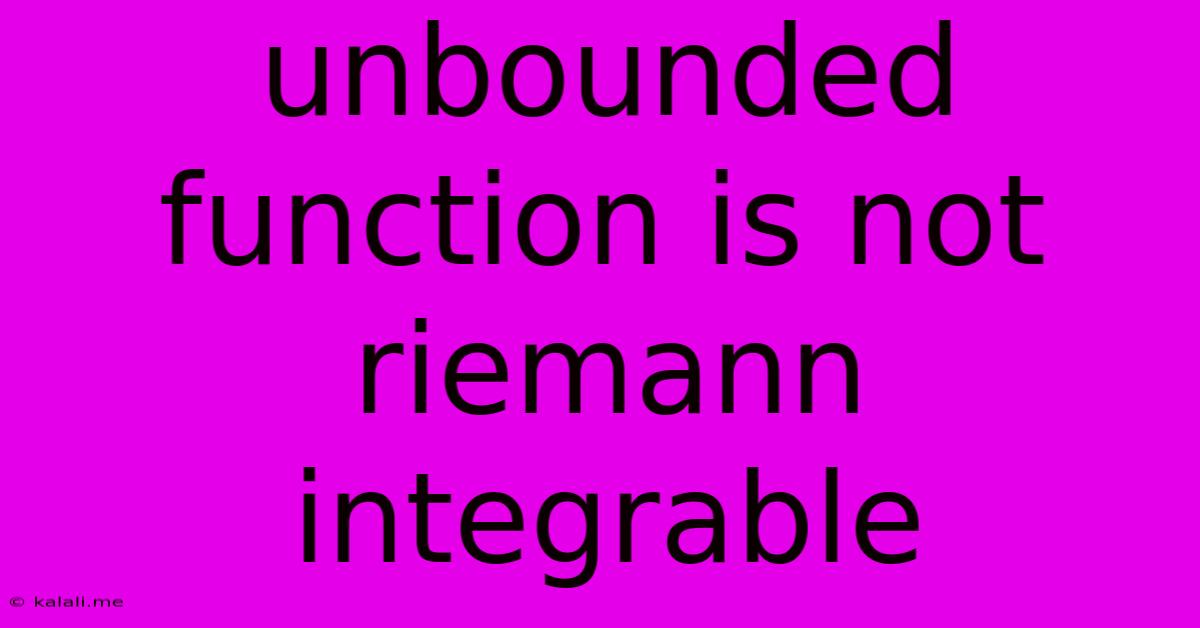Unbounded Function Is Not Riemann Integrable
Kalali
May 23, 2025 · 3 min read

Table of Contents
Unbounded Functions: Why They're Not Riemann Integrable
This article explores the fascinating relationship between unbounded functions and Riemann integration. We'll delve into why unbounded functions, unlike their bounded counterparts, fail to meet the crucial criteria for Riemann integrability. Understanding this concept is fundamental to grasping the limitations of Riemann integration and appreciating the need for more advanced integration techniques.
Understanding Riemann Integrability: At its core, the Riemann integral relies on the ability to approximate the area under a curve using rectangles. We partition the interval of integration into smaller subintervals, constructing rectangles whose heights are determined by the function's value within each subinterval. As the width of these subintervals shrinks to zero, the sum of the areas of these rectangles approaches the definite integral, provided the function is bounded and the limit exists.
The Problem with Unbounded Functions: The key to Riemann integrability is the existence of a supremum (least upper bound) and infimum (greatest lower bound) for the function's values within each subinterval. This ensures that the heights of our rectangles remain within a finite range. However, unbounded functions, by definition, lack this crucial property. They can take on arbitrarily large (or small) values within any given subinterval, regardless of its size.
Illustrative Example: Consider the function f(x) = 1/x on the interval (0, 1]. This function is unbounded because as x approaches 0, f(x) approaches infinity. No matter how fine a partition we create on this interval, there will always be subintervals containing values of f(x) that are arbitrarily large. Consequently, the sum of the areas of the rectangles will not converge to a finite limit. Therefore, f(x) = 1/x is not Riemann integrable on (0, 1].
Why the Riemann Sum Fails: Let's break down why the Riemann sum fails for unbounded functions:
- Infinite Upper Sums: For an unbounded function, the upper Riemann sums (using the supremum of the function on each subinterval) will always be infinite.
- Non-Convergence: The difference between the upper and lower Riemann sums (using the supremum and infimum respectively) will not converge to zero as the partition becomes finer. This non-convergence is a direct consequence of the unbounded nature of the function.
- No Finite Area: The concept of a definite integral relies on the area under the curve being finite. An unbounded function often represents an area that extends infinitely, preventing the calculation of a finite definite integral using the Riemann approach.
Beyond Riemann Integration: The limitations of Riemann integration for unbounded functions highlight the need for more powerful techniques. The Lebesgue integral, for example, is a more general integration method that can handle a broader class of functions, including many unbounded ones. The Lebesgue integral employs a different approach to measure the area under a curve, allowing for the integration of functions that are not Riemann integrable.
In Conclusion: The unbounded nature of a function prevents it from satisfying the fundamental conditions required for Riemann integrability. The inability to define finite upper and lower sums results in the failure of the Riemann sum to converge to a definite value. While Riemann integration is a valuable tool for many applications, understanding its limitations and the reasons behind them is vital for a thorough understanding of integration theory. For handling unbounded functions, more sophisticated methods like Lebesgue integration are necessary.
Latest Posts
Latest Posts
-
Why Is My Smoke Detector Chirping
May 24, 2025
-
Why Did Jacob Wrestle With God
May 24, 2025
-
Burning The Candle At Both Ends
May 24, 2025
-
How To Use Laptop As Monitor
May 24, 2025
-
Substitute Brown Sugar For White Sugar
May 24, 2025
Related Post
Thank you for visiting our website which covers about Unbounded Function Is Not Riemann Integrable . We hope the information provided has been useful to you. Feel free to contact us if you have any questions or need further assistance. See you next time and don't miss to bookmark.